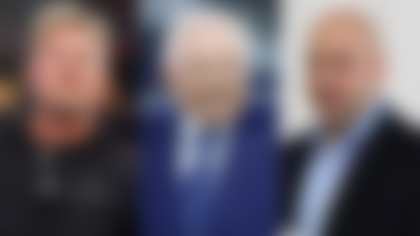SAN JOSE -- Father and son talk after every game.
Dad is 86 now, living down around the southern tip of Florida. The boy, the youngest of five, is 50 and growing into a spitting image of the old man. From a distance, he seems to be walking right out of old family photos. The swooping hair and gentle eyes fit Mike Shula. Coated in his Carolina tan, he reminds the NFL's old guard so much of Don, a two-time Super Bowl champion, 14-time division champion, three-time author and former National Guard service member who is among those anchored atop the list of the most important minds in NFL history.
But Don likes Mike because he's trying to be his own man. He always was. Growing up, Mike's older brother, Dave, took after dad the most. Dave was intense and lived off adrenaline. He became an NFL head coach at just 32. Mike is quiet and considerate. He's more cerebral. He is still waiting for his first head-coaching job in the league.
"Dave was more excitable," Don said in a recent phone conversation. "Mike was laid back and always thought about what he was going to do or say."
On Jan. 24, the two got to talk about the Super Bowl. Mike, the offensive coordinator of the Panthers, is going for the first time as a coach after his team dismantled the Cardinalsin the NFC title game. Assistants and players credit him for transforming quarterback Cam Newton into a shoo-in for the league's Most Valuable Player award. An opposing Bronco, after watching hours of Panthers film, called Mike a genius.
Don was clear when they spoke: He wasn't going to miss the chance to see this in person.
"It's going to be special," he said. "I want to make sure I'm there for him. I knew -- somehow, some way, I was going to be with him."
It's a little harder for Don to get around these days. His back aches. He is often seen in a wheelchair or walker. Longer sentences can sometimes leave him out of breath, and he's prone to forgetting where he's put his belongings every now and then. Football is a clearing agent of sorts, and he can still identify whenever Mike calls a play from dad's book. Football is the bind that has kept him so close to his son.
But Don's journey to California this week is more than just the culmination of long talks on the telephone. It is the chance to see Mike emerge from his vivid memories of Super Bowls past and create something of his own.
"He's excited," Mike said this week. "He's a dad first."
The Broncos' defensive staff closed the book on its game plan just a few hours before "Opening Night" of Super Bowl 50 on Monday. They treated the off week like the lead-in of a typical regular-season matchup, to leave more time for perfecting and polishing.
The hope was that it would take on a normal feel. Maybe Mike Shula's offense wouldn't seem so unstoppable. Maybe Newton wouldn't be as confounding.
Rival coaches describe Shula as less of an artist and more of a mechanic. When Shula arrived in Carolina back in 2011 as the quarterbacks coach, there was already a vision put in place for Newton by then-offensive coordinator Rob Chudzinski. Shula was careful not to stray when he replaced Chudzinski, who'd left to coach the Cleveland Browns, for the 2013 season, but he wanted to build off the basics.
The addition of zone-read and power-run elements has taken the Panthers to another level. Newton, who may have run more traditional power plays than any quarterback since the single-wing era, passed for 3,837 yards in 2015, with 35 passing touchdowns and just 10 interceptions. He racked up another 636 yards and 10 touchdowns on the ground. It was arguably the finest season for a dual-threat quarterback in modern NFL history.
"From Day 1, he just had a great feel for Cam," quarterbacks coach Ken Dorsey said. "A feel for what he wanted to do and his vision. He didn't want to change everything; it was just little tweaks here and there for what was already a great deal.
"Anytime you can limit change for a quarterback, it's huge."
Shula is dependent on simplicity, though he will not close the book on his own game plan until kickoff. He consulted with coaches he trusted outside of the building this week and, of course, talked to Don.
Game planning against Shula, especially this year, is nearly impossible. The power runs wear on a defense. The vertical element puts games away with hair-trigger speed. A cadre of wide receivers like Ted Ginn Jr. and Jerricho Cotchery turn into synchronized street-ball players, drifting to the open parts of the field.
It's a series of tweaks that Shula perfected over time. After a head-coaching stint with Alabama ended in 2006, the former Crimson Tide and Tampa Bay Buccaneers signal caller went back to his roots. For the next six years, he would coach quarterbacks and only quarterbacks; David Garrard during Jacksonville's last winning season (2007) and Cam Newton from the moment Newton arrived in the building as a rookie.
"I really believe that -- to me -- behind every player is a sound, fundamental coach. Sound in a way that you have to be able to make the player believe what you're selling works," Broncos linebackers coach Reggie Herring said. "And then the fact that you have to have a plan so he can use his God-given abilities at the highest level. And anyone who is performing [as well as Cam] and thinks it's just him ... I think there's a sound fundamental coach behind him with a great plan. And I think that's what has happened with Shula."
Tulane Stadium was dipping toward freezing. It was January 1972, and the boy was 6 years old and sitting in the upper deck for Super Bowl VI. He begged his mom for a hot dog and remembers the way it nearly went stiff and inedible due to the weather outside. Don Shula's Dolphins lost to the Cowboys, 24-3.
Perhaps the most incredible part of their father-and-son relationship is how vividly this game appears and re-appears in their collective memory. Don Shula was a Super Bowl institution, reaching the title game three straight years between the 1971 and 1973 seasons. He won the latter two. Mike, who was just coming of age, tracks the epic moments like a child -- what he bought, ate, smelled and heard. Some kids play catch in the park; Mike watched dad win rings.
The year after the hot dog, Mike remembered the red transistor radio his parents bought him for Super Bowl VII, in which the Dolphins beat the Washington Redskins, 14-7. At 7 years old, he was entirely immersed, able to follow the soundtrack of one of dad's greatest moments as it happened.
At halftime of Super Bowl VIII, he passed by a merchandise stand and convinced his mom to purchase a Dolphins flag with a message for the Vikings, a team dad would end up burying that afternoon, 24-7.
"The one for Miami said, 'Dolphins No. 1; Vikings eat your heart out.' I said, 'Mom let me get it. I want to get it.' She said, 'No, it's only halftime. We have a long way to go,' " Mike said. "I talked her into getting it, and sure enough, the opening kickoff of the second half, the Vikings return it for a touchdown. There was a penalty on the play, though. Those are the little things you remember as a kid."
When the two talk after every Panthers game, it's more of a guided analysis. Don will ask Mike why he called the plays he did. Mike will talk through the mistakes and explain -- maybe even to himself -- how he can get better.
Next to the few seasons in the early 1990s when Mike was an assistant on Don's staff, these are Don's happiest football moments. The game keeps his son close by, always calling.
Now, this game will keep dad looking forward. Through the hazy spells, body aches and fatigue, there is a Super Bowl to watch. Now, he can be in the stands. Now, dad can commit to memory something he will never forget.
"I'm going to make sure I'm there," dad said. "With him."
Follow Conor Orr on Twitter @ConorOrr.



